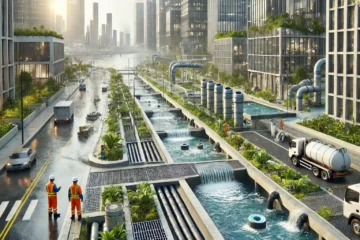The Role of Contracting Companies in Rainwater Drainage and Treatment
Rainwater management has become one of the most critical challenges for modern cities, especially in regions that experience sudden heavy rainfall or changing climate conditions. Effective drainage and treatment systems are essential to protect infrastructure, prevent flooding, and ensure environmental sustainability. Contracting companies play a central role in designing, constructing, and maintaining these systems, combining engineering expertise with innovative technology to deliver safe and efficient solutions.
1. Planning and Design of Drainage Networks
The first step in managing rainwater is the proper planning and design of drainage systems. Contracting companies collaborate with engineers, urban planners, and government authorities to create comprehensive drainage networks that can handle high water volumes.
- Site Analysis: Contractors study the topography, soil composition, and rainfall patterns to identify water flow directions.
- Infrastructure Integration: They design pipelines, channels, and catch basins that connect seamlessly with existing roads and public utilities.
- Sustainable Solutions: Many contractors now implement eco-friendly approaches such as permeable pavements and green roofs to reduce runoff and promote natural absorption.
2. Construction of Rainwater Drainage Systems
Once the design is finalized, contracting companies handle the execution and construction phase. This involves:
- Installing Underground Pipelines: Contractors lay durable pipes and culverts to direct rainwater away from residential and commercial areas.
- Building Stormwater Drains: Surface drains and gutters are constructed to capture rainwater and prevent flooding in streets and neighborhoods.
- Quality Control: Advanced materials and construction methods are used to ensure the system can withstand heavy rainfall and long-term usage.
3. Rainwater Treatment and Reuse
Beyond drainage, many contracting companies also focus on treatment and recycling of rainwater. With rising concerns about water scarcity, treated rainwater can be reused for irrigation, cleaning, and industrial applications.
- Filtration and Sedimentation: Contractors build treatment facilities that filter debris, sediments, and pollutants from collected rainwater.
- Storage Systems: Tanks and reservoirs are installed to store treated water safely for future use.
- Eco-Friendly Technology: Innovative solutions, such as biofiltration and natural wetlands, are incorporated to reduce chemical use and promote sustainable water treatment.
4. Maintenance and Upgrading of Drainage Systems
Rainwater management does not end after construction. Contracting companies provide long-term maintenance services to keep systems efficient.
- Regular Cleaning: Drains and pipes are cleaned to prevent blockages and overflow.
- Inspection and Repairs: Contractors monitor structural integrity, repairing cracks or leaks before they become major issues.
- System Upgrades: As cities expand and rainfall patterns change, contractors upgrade networks to handle increased water flow.
5. Contribution to Public Safety and the Environment
The work of contracting companies goes beyond engineering—it directly impacts public safety and environmental protection. Proper drainage prevents flooding that can damage homes, roads, and businesses, while treated rainwater helps conserve natural water resources.
Moreover, by reducing stagnant water, contractors help prevent the spread of diseases caused by mosquitoes and other pests



